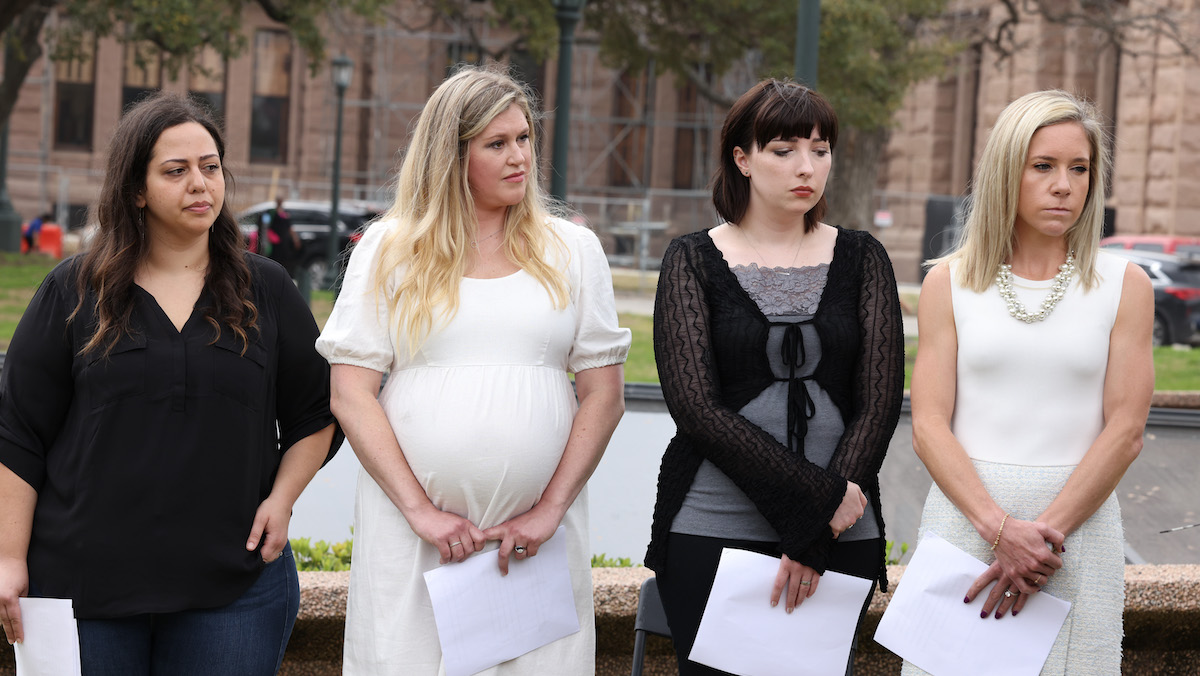In the year since the U.S. Supreme Court issued its ruling in Dobbs v. Jackson Women's Health Organization that ended nearly a half-century of a nationwide right to abortion, states have enacted contrasting policies on the issue. The Dobbs decision overturned the 1973 Roe v. Wade ruling that protected the right to an abortion until fetal viability, which is generally considered to be around 23 or 24 weeks of pregnancy.
The ruling by the high court's conservative majority sparked a slew of anti-abortion laws severely restricting the procedure across nearly half the country. At least 12 Republican-governed states implemented sweeping bans on abortion and several others are seeking to do the same.
STAY IN THE KNOW
Watch NBC10 Boston news for free, 24/7, wherever you are. |
|
Get Boston local news, weather forecasts, lifestyle and entertainment stories to your inbox. Sign up for NBC Boston’s newsletters. |
Another handful of states have enacted near-total bans or prohibitions after 6 weeks of pregnancy, before many women know they are pregnant.
Meanwhile, opponents of abortion have been defeated by ballot measures in Kansas, Michigan and Kentucky, as voters casted their ballots in support of a woman's right to chose. Several state courts have also blocked some of the bans from taking effect.
A state-by-state breakdown of where things stand:
STATES WHERE ABORTION IS BANNED THROUGHOUT PREGNANCY
ALABAMA
- Law adopted in 2019 took effect after Dobbs.
- Exception: Woman's life or health.
ARKANSAS
- Law adopted in 2019 took effect after Dobbs.
- Exceptions: Woman's life.
IDAHO
- Law adopted in 2020 took effect after Dobbs.
- Exceptions: Rape, incest and life of the woman. A judge has blocked enforcement in cases of medical emergencies.
- The state also has a law making it a felony to transport a minor for the purpose of obtaining an abortion without parental consent.
KENTUCKY
- Law adopted in 2019 took effect after Dobbs.
- Exceptions: Health or life of the woman.
- Kentucky voters in 2022 defeated a ballot question for an amendment that would have declared there to be no right to abortion in the state constitution.
LOUISIANA
- Law adopted in 2006 took effect after Dobbs.
- Exceptions: Life or heath of the woman.
MISSISSIPPI
- Law adopted in 2007 took effect after Dobbs.
- Exceptions: Rape and the life of the woman.
MISSOURI
- Law adopted in 2019 took effect after Dobbs.
- Exceptions: Life or heath of the woman.
NORTH DAKOTA
- A new law was adopted in 2023, replacing one that was blocked by a court.
- Exceptions: Rape, incest and health or life of the woman.
OKLAHOMA
- Law adopted in 2022 took effect after Dobbs.
- Exceptions: Life of the woman.
SOUTH DAKOTA
- Law adopted in 2005 took effect after Dobbs.
- Exceptions: Life of the woman.
TENNESSEE
- Law adopted in 2020 took effect after Dobbs.
- Exceptions: Health or life of the woman.
TEXAS
- Law adopted in 2021 took effect after Dobbs.
- Exceptions: Health or life of the woman.
WEST VIRGINIA
- Ban adopted in 2022 after the Dobbs ruling.
- Exceptions: Rape, incest and health or life of the woman.
WISCONSIN
- Ban is from an 1849 law. There's litigation over whether it should be in effect.
- Exceptions: Woman's life.
More Roe v. Wade Coverage:
STATES WHERE ABORTION IS BANNED AFTER 6 TO 15 WEEKS OF PREGNANCY
ARIZONA
- A ban on abortion after 15 weeks’ gestation was adopted in 2022 and took effect after the Dobbs ruling.
- Exceptions: Health or life of the woman.
- A state court has ruled that a ban on abortion at all stages of pregnancy does not apply to doctors; there's a legal dispute about whether it is in effect for “helpers.”
GEORGIA
- Law adopted in 2019 bans abortion once cardiac activity can be detected, generally around six weeks into pregnancy — and before women often know they're pregnant.
- Exceptions: Rape, incest and health or life of the woman.
NEBRASKA
- Law adopted in 2023 bans abortion at 12 weeks' gestational age.
- Exceptions: Rape, incest and life of the woman.
STATES WHERE BANS HAVE BEEN ADOPTED BUT ARE NOT YET IN EFFECT
FLORIDA
- A ban on abortion after 15 weeks’ gestation was adopted in 2022 and took effect after the Dobbs ruling.
- Exceptions: Health or life of the woman.
- If a court finds the current ban to comply with the state constitution, it is to be replaced with a more stringent one adopted in 2023 that would ban abortion after six weeks and add exceptions for cases of rape and incest.
NORTH CAROLINA
- A ban on abortions after 20 weeks is in place until July 1, when a ban after 12 weeks, with exceptions for the health and life of the woman, rape and incest takes effect.
STATES WHERE BANS OR RESTRICTIONS HAVE BEEN PUT ON HOLD BY COURTS
INDIANA
- A ban on abortion after 22 weeks’ gestation is in place.
- A law to ban abortion at any point in pregnancy was adopted in 2022 after Dobbs, but the Indiana Supreme Court put it on hold.
MONTANA
- Abortion is banned after viability. A Montana judge has put on hold enforcement of a ban on abortions after 20 weeks and one on the most commonly used procedure in the second trimester, dilation and evacuation, after 15 weeks.
OHIO
- A ban on abortions after 22 weeks is in place. A county judge put on hold a ban on abortion after cardiac activity can be detected. The state Supreme Court is reviewing that decision.
- Abortion-rights groups are pursuing a measure for the November ballot that would enshrine in the state constitution a right to make one's own decisions about a variety of reproductive care issues.
SOUTH CAROLINA
- A ban on abortions after 20 weeks is in place. A judge has put on hold enforcement of a ban after cardiac activity can be detected.
UTAH
- A ban on abortions after 18 weeks is in place. A state court has put on hold enforcement of a ban on abortions at all stages of pregnancy. A ban on abortion clinics is also on hold.
WYOMING
- Abortion is banned after viability. Courts have put on hold enforcement of two different bans at all stages of pregnancy, and blocked a specific ban on abortion pills while a lawsuit proceeds.
STATES THAT HAVE MOVED TO PROTECT ABORTION ACCESS
CALIFORNIA
- Abortion is banned after viability.
- Since last year, the state has adopted an executive order, laws and a state constitutional amendment to protect abortion access.
COLORADO
- Abortion is not banned at any point in pregnancy.
- An executive order and laws to protect access to abortion and one to bar “deceptive practices” by anti-abortion centers have been adopted since last year.
CONNECTICUT
- Abortion is banned after viability. An executive order signed last year protects access to abortion.
DELAWARE
- Abortion is banned after viability. A law has been adopted since last year to protect access.
DISTRICT OF COLUMBIA
Abortion is not banned at any point in pregnancy. A law has been adopted since last year to protect access.
HAWAII
- Abortion is banned after viability. An executive order and law have been adopted since last year to protect access.
ILLINOIS
- Abortion is banned after viability. A law has been adopted since last year protecting access.
MAINE
- Abortion is banned after viability. An executive order has been signed since last year protecting access.
MARYLAND
- Abortion is banned after viability. A law has been adopted since last year protecting access.
MASSACHUSSETS
- Abortion is banned after 24 weeks. A law has been adopted since last year protecting access.
MICHIGAN
- Abortion is banned after viability. A constitutional amendment was adopted in 2022 to protect abortion access.
MINNESOTA
- Abortion is banned after viability. An executive order and law have been adopted since last year to protect access.
NEVADA
- Abortion is banned after 24 weeks. An executive order and law have been adopted since last year to protect access.
NEW JERSEY
- Abortion is not banned at any point in pregnancy. A law has been adopted since last year protecting access.
NEW MEXICO
- Abortion is not banned at any point in pregnancy. An executive order and law have been adopted since last year to protect access.
NEW YORK
- Abortion is banned after viability. Laws have been adopted since last year to protect access.
PENNSYLVANIA
- Abortion is banned after 24 weeks. An executive order has been signed since last year protecting access.
RHODE ISLAND
- Abortion is banned after viability. An executive order has been signed since last year protecting access. A 2023 law expands coverage for abortion for state workers and Medicaid enrollees.
VERMONT
- Abortion is not banned at any point in pregnancy. A constitutional amendment and law protecting access have been enacted since last year.
WASHINGTON
- Abortion is banned after viability. An executive order and law have been adopted since last year to protect access.
STATES WHERE KEY ABORTION POLICIES ARE UNCHANGED SINCE DOBBS
ALASKA
- Abortion is not banned at any point in pregnancy.
IOWA
- A ban on abortion after 22 weeks’ gestation is in place.
KANSAS
- A ban on abortion after 22 weeks’ gestation is in place.
- Voters in 2022 defeated a ballot question that would have found no right to abortion in the state constitution.
NEW HAMPSHIRE
- Abortion is banned after 24 weeks.
OREGON
- Abortion is not banned at any point in pregnancy.
VIRGINIA
- Abortion is banned after the second trimester, around 26 weeks.



